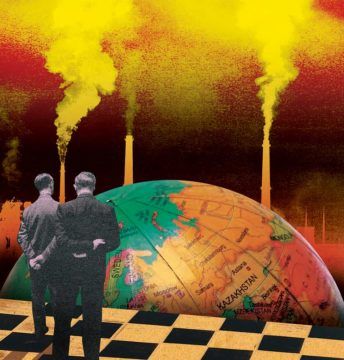 Thea Riofrancos in The Nation (illustration by Tim Robinson):
Thea Riofrancos in The Nation (illustration by Tim Robinson):
n 1957, as the postwar economic boom led to a “great acceleration” in hydrocarbon energy use, a group of scientists working for a Texas-based petroleum company called Humble Oil (later renamed ExxonMobil) embarked on a study prompted by growing public concern over air pollution and new research on the consequences of burning fossil fuels. What they found was that the “enormous quantity of carbon dioxide” in the atmosphere was linked to the “combustion of fossil fuels.” Sixty-five years later, reality has proved to be even worse than their findings. With the unchecked combustion of fossil fuels releasing enormous quantities of carbon, the world is now on track to reach 5.8 degrees Fahrenheit above preindustrial levels. At the most recent UN Climate Change Conference, the assembled heads of state produced, yet again, zero binding commitments to reduce those emissions. And despite the green rhetoric, only 6 percent of the fiscal stimulus packages implemented by the G20 nations in 2020 and 2021 have contributed to emissions reductions, even as oil company profits soared to record highs. Amid government inaction, it has also become clear that the private sector will not save us. We’ve been told that benevolent investors would reroute capital away from dirty energy sectors and toward the green industries of the future. But the promise of “socially responsible finance” has proved to be mostly a scam. Despite pledges to do otherwise, Blackrock, the world’s largest asset manager, has continued to invest in fossil fuel companies, and the production of coal—the dirtiest fossil fuel—is now on the rise.
Meanwhile, with neither states nor capital doing all that much to slash carbon use, emissions have fully rebounded from their pandemic slump.
More here.
